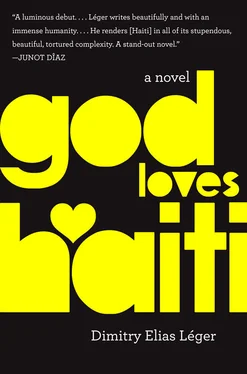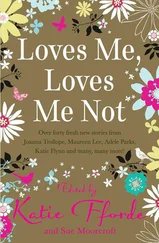They sat together in the lone room with a roof, bathed, during the day, by light filtered to a rainbow kaleidoscope of hues by a stained-glass window. When not crying or praying, Natasha passed the time listening to Monsignor Dorélien, wondering how she screwed up her shot at heaven so completely when life’s fragility should have given her better ways to spend the finite time she had. How could you have forgotten to be grateful for the loves in your life? How could you abuse them so? Monsignor Dorélien, for his part, simply wished the child would eat something.
You should go out and find him, the priest said out of the blue one afternoon.
You should rest, Natasha said.
What’s today’s date? He asked.
February fourteenth, she said.
Ah, it’s Valentine’s Day, he said. Is that why you’re so grumpy? You miss him, don’t you?
Who?
The boy.
You mean, my husband.
No, I mean the man you love more than Jesus.
Father, you blaspheme. That’s not funny.
Monsignor Dorélien started to laugh, but the mirth got blocked by his collapsed lungs and reverted to a cough, a choked rattle so violent it scared away the black vultures that had been waiting on top of the church’s pink walls for his corpse.
You should leave me be, the priest whispered once his coughing fit subsided, exhausted. I’m done. I’ll die as soon as your sad eyes turn away.
I can’t, the young girl whispered, eyes welling with affection.
The priest, who was gray like a damp sheet and so close to death you could almost see the angels standing guard check their watches, lifted a trembling hand and placed it on Natasha’s hand. The girl grasped the hand so hard it almost hurt him. This is new, the priest thought. Since Natasha Robert had been a child she had one quirk: she hated to be touched. She was a wonderfully pleasant girl. She was quick, kind, and pretty, with flowing heaps of curly hair that attracted people’s attention like bees to honey. She also had the pretty girl’s desire to deflect attention, to be seen as a madonna and not a doll or trophy. Of all the orphans and young people Monsignor Dorélien had taken under his wing in his sixty-year career, Natasha Robert was unique in that she asked for precious little — from the church, God, or her fellow man, especially men. Instead, she was a giver, an eager-to-pleaser. She gave kindness, inspiration, sympathy, and humor. She strove to give her community beauty. She yearned for security and the comfort of reliable routine, like everyone else, but she did not actively seek it from the people around her. We are all children and would prefer to behave like children at our happiest, the priest knew, but this child, by fate or nurture, worked hard to hide her inner child, even when she had been a child and had every right to petulance and selfishness. Once she entered the cathedral that fateful day as a preteen, she developed into something of an actress. She liked to pretend to play the role of the charitable adult in charge that most of us often avoided or performed clumsily. She was a sweetheart at it as long as you didn’t touch her.
Something had changed in the child since the disaster, Monsignor Dorélien feared. When she found him buried alive in his office in the back of the cathedral, she had summoned all her strength, and God’s grace with more than a few deargodhelpmes, to pull cement blocks off him as quickly as she could. Which was natural and typical of Natasha, Monsignor Dorélien knew. What was new was the desperation and pitch of her cries for help once her strength began to falter. Those cries were heartrending. Monsignor Dorélien almost wished he had died so he could have been spared hearing the anguish in the child’s voice that day. The men who eventually joined her in saving what little of him was left under the unbearable embrace of the massive slabs of granite seemingly doubled their efforts to quiet the hysterical child.
For a long while afterward, the girl stared at the wounded priest in dumbfounded silence. She seemed elated that her prayers for his rescue had come true, but she couldn’t understand why her prayers for others’, notably Alain’s, did not. The ideas of atheists sneaked up on her. Life was just a game. Life had no deeper meaning for humans than it had for animals. There was no heaven, and there certainly was no hell. There was no God. There was good luck and there was bad luck. Luck was to be prepared for and seized or frittered away. Bad luck was meant to be endured and shrugged off. Everything passed with time. There are an awful lot of coincidences. Blame yourself for your poverty. Credit your genes, genius, and moxie for your wealth. Hate Dad. Beauty was mathematical. Making money was art. What money bought best were toys. Evolve or get out of the way. What about the conscience? she thought. What did the atheists have to say about the source of pangs of guilt, and the soul, that stupid, bigger-than-you essence of yourself that craved harmony and love with everything and everyone in its environment? Where do they seek comfort in the days after everything they believed in, like justice and love, has fallen apart or disappeared altogether? Things don’t fall apart just in Africa. They fall apart everywhere. Everywhere. Anytime.
I wasn’t ready for the apocalypse, she said.
What apocalypse? Monsignor Dorélien said.
You know, the earthquake, Father, the slight twitch of dirt that killed almost everyone we loved in the city the other day.
Child, please. That wasn’t the apocalypse. Do you believe that after the apocalypse, you’d still have the luxury to sit around and feel sorry for yourself? Here I thought you’d finally lost the rose-colored glasses you wore all the time.
But, Father, if that disaster wasn’t the apocalypse, an end of all things, what was it? Punishment? That’s what some people believe, you know.
A test, child. Goudou-goudou was a test. That’s all it was. A test. You’ve read your share of Bible stories. You know God puts the people he loves the most through the worst sacrifices. If you ask me, this is one of the easiest tests we’ve faced in a long time.
The priest chuckled, then coughed.
Why do you say that, Father?
Well, for one, it wasn’t subtle. It was so loud I still can’t hear anyone more than a meter away from me. Every Haitian alive knows it happened, got its message, and responded to it in a way that revealed the limits and strengths of their character and faith. They now know full well how to improve their standing with God and Jesus based on their behavior. Jesus still loves them, but they will find lying about who they are and could be to themselves much harder. Second, the damage the earthquake caused was mostly physical! Rebounding from physical loss, even on that scale, should be a piece of cake for a people who so ably recovered from decades of slavery. The old Port-au-Prince was a city they inherited. The new city will be the one they create for themselves. It’s a rare opportunity to start over fresh. You don’t get many of those in this life. Can they? Can you? It’s not a bad question. You could be facing worse challenges, you know.
Intellectually, that makes sense. Emotionally the whole thing is baffling.
I know it is. Which leads to my third point: the earthquake was the latest sign that God loves Haiti.
He what?
He loves you. Of course God loves Haitians. Why else would He encourage us to keep our faces pressed against the windows of great American and European wealth and grandeur, so close yet so cruelly far, like a nation of Holly Golightlys? Why else would He chin-check us every couple of years with trying natural disasters — an earthquake here, a few hurricanes there, with a dash of floods? Why else would He constantly tempt our rich and powerful to be corrupted by short-term profits in an almost barren world? Finally, why else, dear child, would God make our life so hard yet so sweet on an island so beautiful yet so, so fragile? Think about it: The moral of most stories in the Bible is that God’s chosen people, Adam, Eve, Abraham, the whole lot, will constantly be asked by Him to make the greatest personal sacrifices possible to honor His mysterious glory. The way we Haitians suffer misfortune, deprivation, and disproportionate foreign enmity is right in line with the fate of chosen peoples throughout history. Biblically speaking anyway. God may love us too much, I’d say.
Читать дальше












